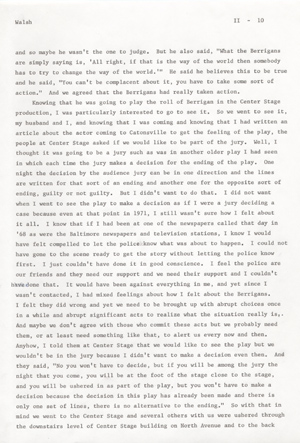 |
The Catonsville Nine's invasion and burning of the Catonsville draft board files: an interview with Jean S. Walsh given on March 30, 1973.
 |
14 / 15 |
 |



| Collection: |
Friends of Catonsville Library |
| Date: |
1973-03-30 |
| Date of Digitization: |
2004-03-31 |
| Source: |
Catonsville Library |
| Original Dimensions: |
28 x 22 cm |
| Creator: |
Walsh, Jean S. |
|
|
Description:
A transcript of a recorded interview with Jean S. Walsh, the editor of Catonsville's local newspaper, the Catonsville Times. She was present at the scene after the burning of draft records in Catonsville on May 17, 1968.
Transcription: and so maybe he wasn't the one to judge. But he also said, "What the Berrigans
are simply saying is, 'All right, if that is the way of the world then somebody
has to try to change the way of the world.'" He said he believes this to be true
and he said, "You can't be complacent about it, you have to take some sort of
action." And we agreed that the Berrigans had really taken action.
Knowing that he was going to play the roll of Berrigan in the Center Stage
production, I was particularly interested to go to see it. So we went to see it,
my husband and I, and knowing that I was coming and knowing that I had written an
article about the actor coming to Catonsville to get the feeling of the play, the
people at Center Stage asked if we would like to be part of the jury. Well, I
thought it was going to be a jury such as was in another older play I had seen
in which each time the jury makes a decision for the ending of the play. One
night the decision by the audience jury can be in one direction and the lines
are written for that sort of an ending and another one for the opposite sort of
ending, guilty or not guilty. But I didn't want to do that. I did not want
when I went to see the play to make a decision as if I were a jury deciding a
case because even at that point in 1971, I still wasn't sure how I felt about
it all. I know that if I had been at one of the newspapers called that day in
'68 as were the Baltimore newspapers and television stations, I know I would
have felt compelled to let the police know what was about to happen. I could not
have gone to the scene ready to get the story without letting the police know
first. I just couldn't have done it in good conscience. I feel the police are
our friends and they need our support and we need their support and I couldn't
have done that. It would have been against everything in me, and yet since I
wasn't contacted, I had mixed feelings about how I felt about the Berrigans.
I felt they did wrong and yet we need to be brought up with abrupt choices once
in a while and abrupt significant acts to realize what the situation really is,.
And maybe we don't agree with those who commit these acts but we probably need
them, or at least need something like that, to alert us every now and then.
Anyhow, I told them at Center Stage that we would like to see the play but we
wouldn't be in the jury because I didn't want to make a decision even then. And
they said, "No you won't have to decide, but if you will be among the jury the
night that you come, you will be at the foot of the stage close to the stage,
and you will be ushered in as part of the play, but you won't have to make a
decision because the decision in this play has already been made and there is
only one set of lines, there is no alternative to the ending." So with that in
mind we went to the Center Stage and several others with us were ushered through
the downstairs level of Center Stage building on North Avenue and to the back
|




